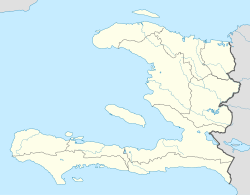
HMAS Choules (L100) is a Bay-class landing ship that served with the Royal Fleet Auxiliary (RFA) from 2006 to 2011, before being purchased by the Royal Australian Navy (RAN). The vessel was built as RFA Largs Bay by Swan Hunter in Wallsend, Tyne and Wear. She was named after Largs Bay in Ayrshire, Scotland, and entered service in November 2006. During her career with the RFA, Largs Bay served as the British ship assigned to patrol the Falkland Islands in 2008, and delivered relief supplies following the 2010 Haiti earthquake.
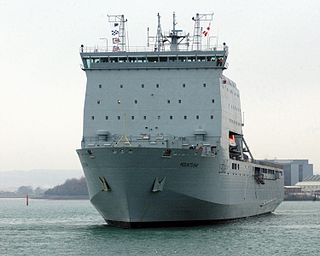
The Bay class is a ship class of four dock landing ships built for the British Royal Fleet Auxiliary (RFA) during the 2000s. They are based on the Dutch-Spanish Royal Schelde Enforcer design, and replaced the Round Table-class logistics ships. Two ships each were ordered from Swan Hunter and BAE Systems Naval Ships. Construction work started in 2002, but saw major delays and cost overruns, particularly at Swan Hunter's shipyard. In mid-2006, Swan Hunter was stripped of work, and the incomplete second ship was towed to BAE's shipyard for completion. All four ships, Largs Bay, Lyme Bay, Mounts Bay, and Cardigan Bay had entered service by 2007.

Gonâve Island or Zil Lagonav is an island of Haiti located west-northwest of Port-au-Prince in the Gulf of Gonâve. It is the largest of the Hispaniolan satellite islands. The island is an arrondissement or Ouest-Insulaire in the Ouest and includes the communes of Anse-à-Galets and Pointe-à-Raquette.

Nippes or Nip is one of the ten departments of Haiti located in southern Haiti. It is the most recently created department, having been split from Grand'Anse in 2003. The capital of the department is Miragoâne, and it is the least populous department in Haiti.
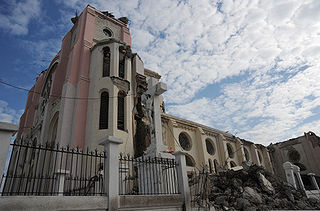
The Archdiocese of Port-au-Prince is a metropolitan archdiocese, responsible for the suffragan dioceses of Jacmel, Jérémie, Anse-à-Veau and Miragoâne and Les Cayes.

Pétion-Ville is a commune and a suburb of Port-au-Prince, Haiti, in the hills east and separate from the city itself on the northern hills of the Massif de la Selle. Founded in 1831 by president Jean-Pierre Boyer, it was named after Alexandre Sabès Pétion (1770–1818), the Haitian general and president later recognized as one of the country's four founding fathers.

Anse-à-Pitres, or Anse-à-Pitre is a commune in the Belle-Anse Arrondissement, in the Sud-Est department of Haiti. Its border crossing to Pedernales is one of the four chief land crossings to the Dominican Republic.
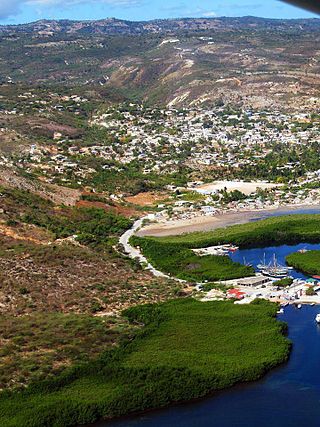
Anse-à-Galets is a commune and city in the La Gonâve Arrondissement, in the Ouest department on Gonâve Island in Haiti, located to the west-northwest of Port-au-Prince in the Gulf of Gonâve. It is the largest commune on the island and has 62,559 inhabitants.
Arnaud is a commune in the Anse-à-Veau Arrondissement, in the Nippes department of Haiti.
L'Asile is a commune in the Anse-à-Veau Arrondissement, in the Nippes department of Haiti. It has 30,240 inhabitants.
Petit-Trou-de-Nippes is a commune in the Anse-à-Veau Arrondissement, in the Nippes department of Haiti. It has 36,143 inhabitants.
Anse-à-Veau is an arrondissement in the Nippes Department of Haiti. As of 2015, the population was 153,639 inhabitants. Postal codes in the Anse-à-Veau Arrondissement start with the number 75.
Belle-Anse is an arrondissement in the Sud-Est department of Haiti. As of 2015, the population was 158,081 inhabitants. Postal codes in the Belle-Anse Arrondissement start with the number 93.
Léogâne is an arrondissement in the Ouest Department of Haiti. As of 2015, the population was 509,280 inhabitants. Postal codes in the Léogâne Arrondissement start with the number 62.
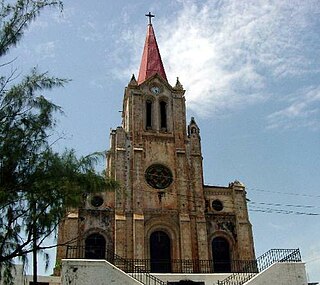
The Roman Catholic Diocese of Anse-à-Veau and Miragoâne is a diocese located in the Nippes, Haiti. It is part of the ecclesiastical province of Port-au-Prince.
The timeline of rescue efforts after the 2010 Haiti earthquake of 12 January 2010 involves the sequence of events in the days following a highly destructive 7.0 Mw earthquake with an epicenter 25 kilometres (16 mi) west of the nation's capital, Port-au-Prince. With at least 70% of the city's buildings destroyed, the earthquake also caused damage and loss of life in other parts of the country. The Haitian government experienced a near-collapse and affected people were left mostly to their own resources until foreign aid arrived in the following days. Initial death toll estimates ranged between 50,000 and 200,000.
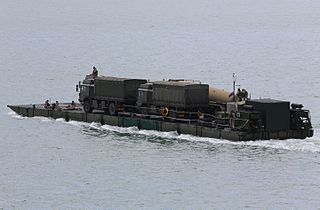
The Mexeflote is a landing raft used by the United Kingdom's Royal Logistic Corps and the Royal Australian Navy to move goods and vehicles between ship and shore. It was first used by British military in the 1960s. It was used during the Falklands War, and has been used in humanitarian aid missions. The system was developed from the earlier to the Rhino ferry. The Mexeflote is named after the Military Engineering Experimental Establishment (MEXE) in the UK where it was designed, in conjunction with the neologism "flote" instead of float.
